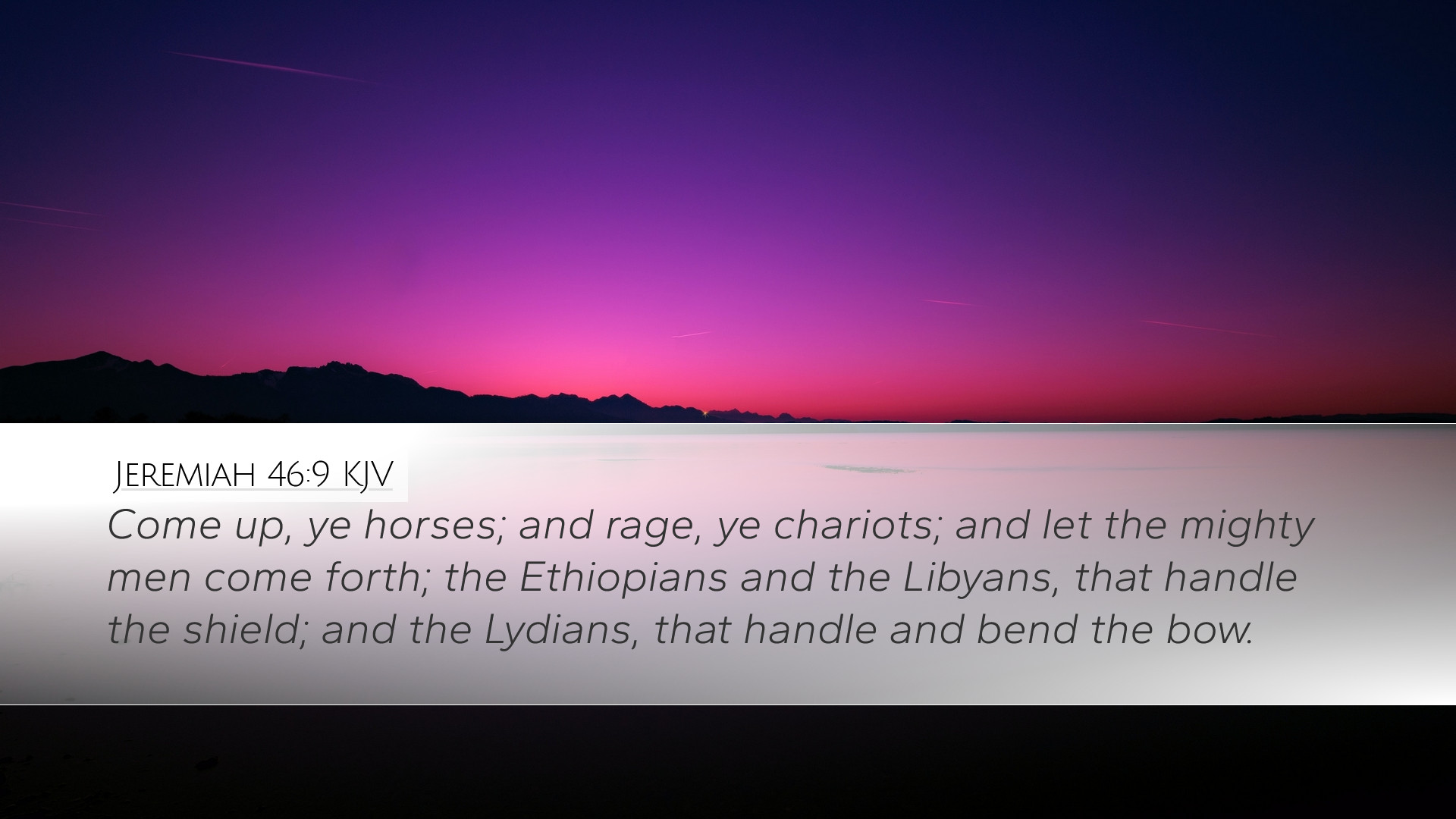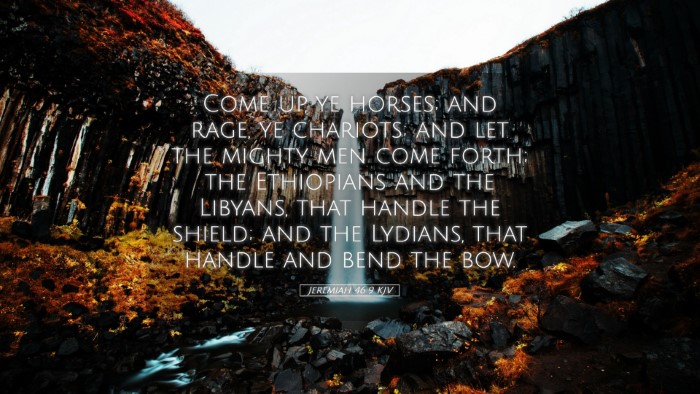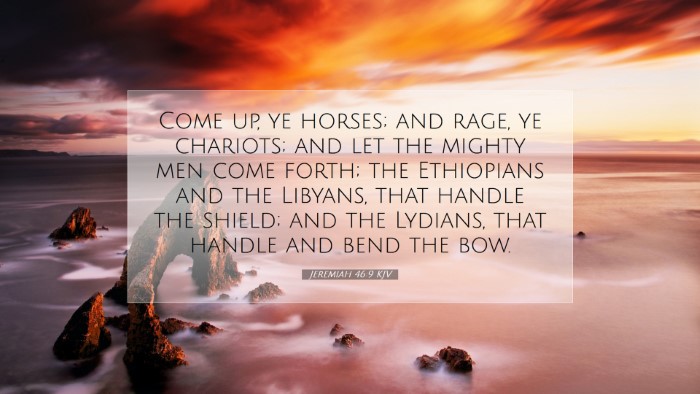Commentary on Jeremiah 46:9
Jeremiah 46:9 states, "Rise up, ye horsemen, and drive furiously, and stand forth in your coats of
mail, ye mighty men of the world." (KJV) This verse is a part of a larger prophecy concerning
Egypt and its impending defeat. What follows is a synthesis of insights from public domain
commentaries by Matthew Henry, Albert Barnes, and Adam Clarke, intended for pastors, students,
theologians, and Bible scholars.
Contextual Overview
The prophecies in this chapter focus on God's judgment against Egypt, depicting the mighty
nation as ultimately powerless against divine sovereignty. This prophecy was delivered at a time
when Egypt was a dominant player in the region, yet it foreshadowed their defeat by Babylon in 586
B.C. The use of military imagery serves to highlight the urgency and seriousness of the impending
events.
Insights from Matthew Henry
Matthew Henry emphasizes the overwhelming nature of God's judgment. He notes that the phrase
"rise up" is a call to action for the warriors of Egypt. In Henry's view, their preparation and
readiness serve as a false sense of security, yet this futile effort will culminate in their
ultimate downfall. Henry remarks on the importance of recognizing God's sovereignty over nations
and the assurance that even the mightiest of forces cannot stand against His decree.
Key Themes from Henry's Commentary
-
The Futility of Human Strength: Henry suggests that the preparations of the
Egyptian soldiers are in vain, illustrating the theme that human power cannot rival divine
authority.
-
A Call to Accountability: The leaders of Egypt are called to muster their forces,
which can be seen as an invitation to recognize their accountability before God.
-
God’s Justice: The disastrous fate awaiting Egypt serves as part of God's
broader narrative of justice against nations that oppose His will.
Insights from Albert Barnes
Albert Barnes offers a detailed examination of the historical context surrounding Jeremiah 46:9.
He points out that this chapter presents a prophetic declaration not only about the military
engagement but the spiritual condition of Egypt as well. Barnes interprets "horsemen" as symbols
of power and speed, while "coats of mail" signifies the armor of preparation. Nevertheless,
he emphasizes that despite their military readiness, they are destined for defeat.
Key Themes from Barnes' Commentary
-
Historical Context: Barnes highlights the significance of understanding the
geopolitical situation of Egypt and Babylon during this time, as it illuminates the prophecy's
depth.
-
Divine Intervention: He describes God's direct intervention in human affairs,
leading to the downfall of nations despite their military might.
-
Symbolism of Military Readiness: The armor and readiness of the Egyptian forces
symbolize the false security that individuals and nations often rely upon instead of trusting
in God's protection.
Insights from Adam Clarke
Adam Clarke's commentary provides an analytical view of the verse focusing on the invocations of
military urgency. There is a noticeable shift in the dialect of strength depicted, as Clarke
stresses the irony of calling these “mighty men” to action when in fact, they are marching
towards inevitable ruin. His interpretation brings forth a philosophical reckoning of human
ambition versus divine ordination.
Key Themes from Clarke's Commentary
-
The Irony of Power: Clarke underlines that those strong in their own might
may be leading themselves to destruction, revealing the tragic irony present in human
endeavors without God’s favor.
-
The Divine Sovereignty: He affirms the paramount principle that God alone
controls the outcomes of nations, regardless of their own pursuits of strength.
-
Preparation for Battle vs. Preparation for God: Clarke reflects on how humans
often prepare for worldly conflicts while neglecting spiritual readiness, leading to disaster
in the absence of God's guidance.
Theological Implications
From the collective insights of these commentaries, we can draw several theological implications
for modern readers:
-
Trust in God's Sovereignty: In times of turmoil, believers are reminded that
God’s plan prevails, and earthly powers are ultimately under His control.
-
Accountability Before God: Nations and individuals are accountable to God;
fortifications of human strength cannot negate divine judgment.
-
Spiritual Preparedness: The call to arms in this verse serves as a metaphor
for the spiritual battles believers face today, urging them to place their trust in God rather
than their own capabilities.
Conclusion
Jeremiah 46:9 serves as a poignant reminder of the futility of relying solely on human
strength and preparation in the face of God's sovereign will. The insights from Henry, Barnes,
and Clarke provide a rich tapestry of understanding that can guide pastors, students,
theologians, and Bible scholars in their study and application of Scripture. Ultimately, this
verse invites reflection on the nature of true strength and the importance of aligning our
endeavors with God's purposes.


